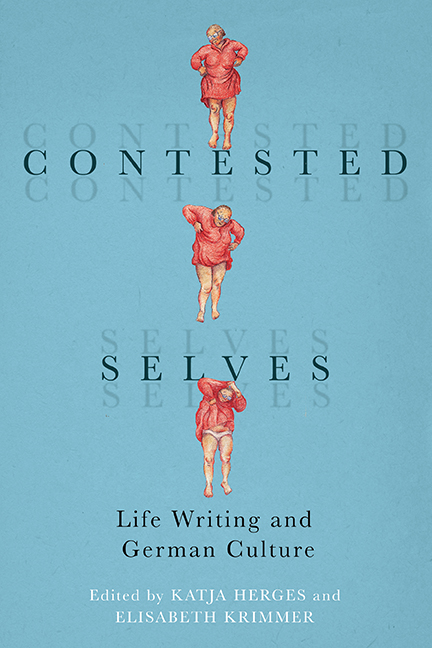Book contents
- Frontmatter
- Contents
- Acknowledgments
- Introduction
- Part I Women’s Life Writing, Female Subjectivity and Agency
- Part II Modern Life Writing and Aesthetics
- Part III Trauma and Vergangenheitsbewältigung
- Part IV Transnational and Transgenerational Life Writing in Contemporary Germany
- Bibliography
- Notes on the Contributors
- Index
5 - A Man of the Century in His Poems: Johannes R. Becher and the Creation of the Twentieth-Century Life Narrative
Published online by Cambridge University Press: 26 May 2022
- Frontmatter
- Contents
- Acknowledgments
- Introduction
- Part I Women’s Life Writing, Female Subjectivity and Agency
- Part II Modern Life Writing and Aesthetics
- Part III Trauma and Vergangenheitsbewältigung
- Part IV Transnational and Transgenerational Life Writing in Contemporary Germany
- Bibliography
- Notes on the Contributors
- Index
Summary
THERE ARE FEW GERMAN AUTHORS in the first half of the twentieth century whose works and life have been called exemplary or prototypical as often as those of Johannes R. Becher. In his youth he was considered one of the most talented and radical among his fellow expressionist poets, and his personal life was certainly scandalous: Becher was not only a morphine addict with serious financial problems but also had to defend himself in court in 1910 for killing his girlfriend in what was meant to be a double suicide that he alone survived. In the mid-1920s he was widely regarded as the preeminent Communist writer of his time and was, again, subject to legal prosecution in a famous high-treason trial. Between 1933 and 1945 Becher, after fleeing to Moscow, organized German emigrant writers in their common fight against the Nazi regime. After his return to Germany, he (co)founded several important East German institutions, including the Kulturbund (Cultural Association), the journal Sinn und Form (Meaning and Form), and the Aufbau publishing house—the latter two still exist today. Becher wrote the national anthem of the GDR (German Democratic Republic) and became the country's first secretary of cultural affairs. To many, he was the perfect embodiment of socialistic realism. GDR officials considered him a poet of the State (Staatsdichter). This ideologically inflected perspective, along with doubts about the literary quality of his writings, is the main reason why post-1989 scholarship has neglected Becher despite his “representative” role.
In the following it is not my goal to “correct” this perception of Becher as a socialistic realist writer or to argue that Becher's work should be remembered because of his great impact on twentieth-century literature. Instead, I will investigate the social, political, and cultural factors that gave rise to the perception of Becher as a prototypical twentiethcentury poet. Previous scholarly literature has given little thought to the possibility that Becher might himself be responsible for the notion that his life and writings are representative of his time. In contrast, I argue that Becher used a variety of strategies to project an image of himself as a prototypical writer and exemplary individual.
- Type
- Chapter
- Information
- Contested SelvesLife Writing and German Culture, pp. 115 - 128Publisher: Boydell & BrewerPrint publication year: 2021



